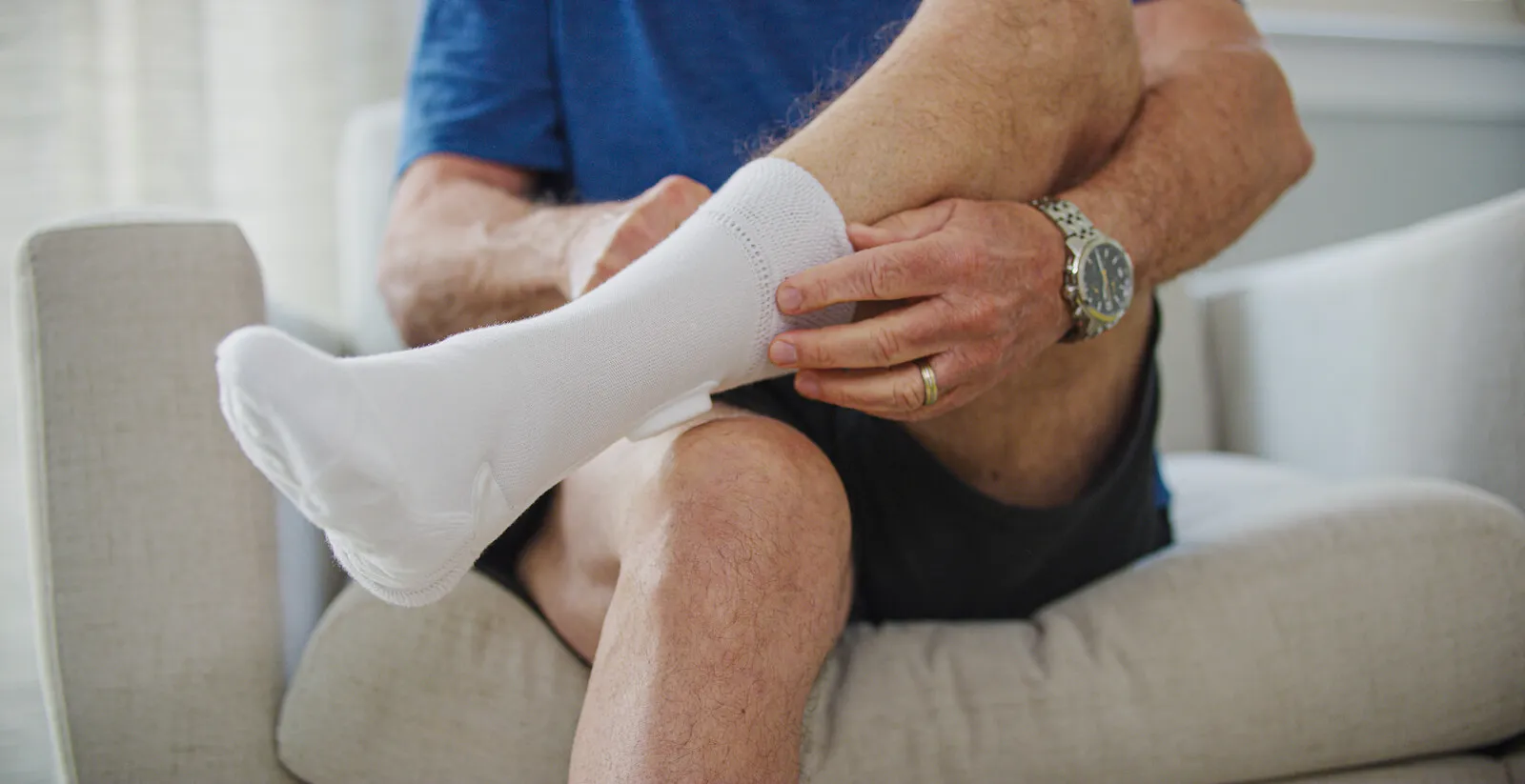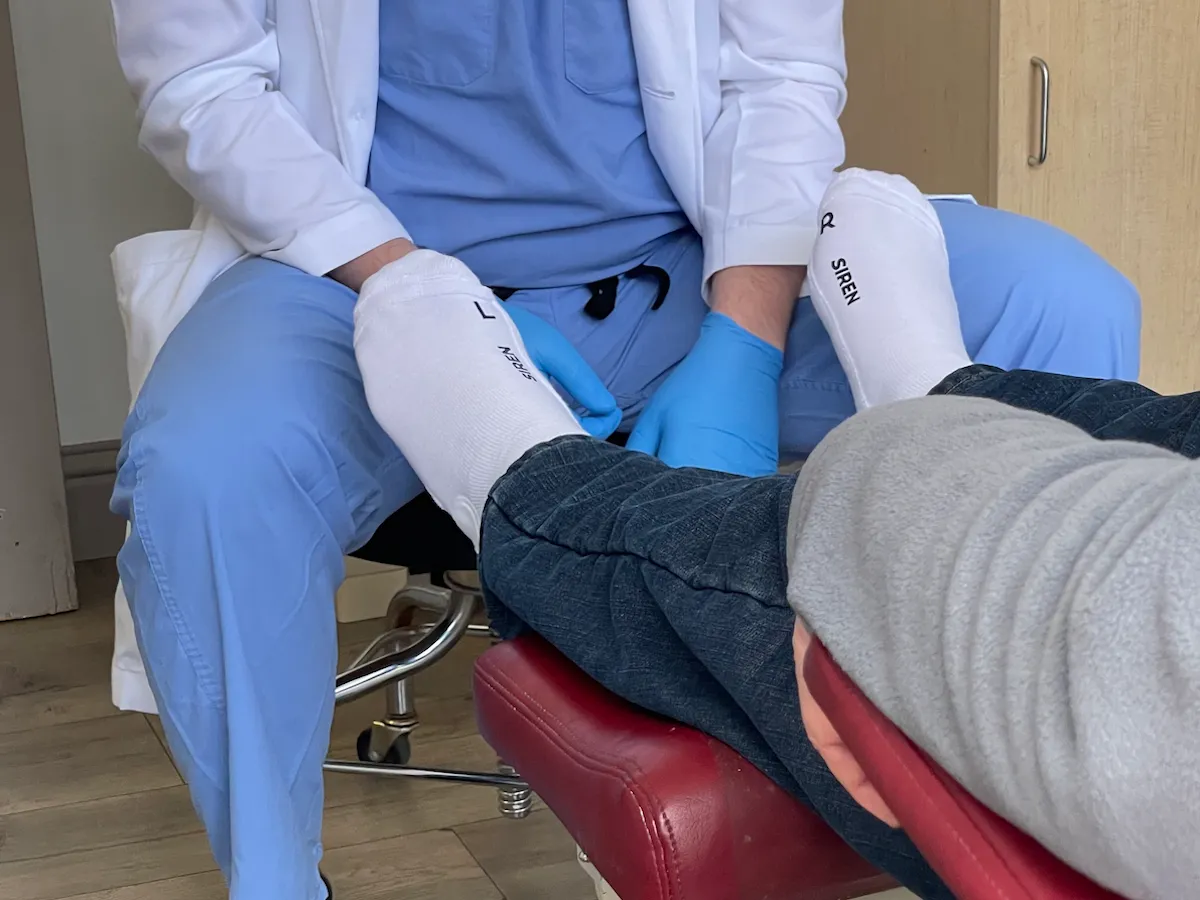-
November 12, 2021
How to Manage Neuropathic Pain
Nerve damage can cause significant pain for people with diabetes. It can be managed through a combination of medications, therapies, and lifestyle changes.

Introduction
Diabetic neuropathy occurs when nerve cells in the arms and legs become damaged due to chronically elevated blood glucose levels. This nerve damage can cause significant pain, leading to limitations in functional ability. The pain usually starts in the feet and hands but can progress further up the legs and arms if left untreated. Improving blood sugar control and creating an effective pain management plan will reduce the impact of neuropathic pain on daily activities.
Symptoms and Diagnosis
Neuropathic pain is most often described as a burning, shooting, tingling, or stabbing sensation in the hands and feet. The severity of pain will vary from person to person but is typically worse for individuals with poorly controlled diabetes.
Other symptoms of diabetic neuropathy include:
- Sensitivity to touch
- Poor motor control
- Muscle weakness
- Loss of balance
Doctors can diagnose diabetic neuropathy based on a physical exam and a thorough review of the individual’s medical history. During an exam, the doctor may perform a series of simple tests to check for nerve damage, such as tendon reflexes, muscle strength and tone, and sensitivity to touch and vibration. Other specific neurologic tests may be performed if deemed necessary by the doctor.
Treatment
There is currently no known cure for diabetic neuropathy—the goals of treatment focus on managing pain and limiting the progression of nerve damage. Controlling your diabetes is the key to reducing nerve damage and pain. Talk with your doctor to establish a target range for your blood glucose levels, and be sure to check your blood sugar daily.
Pain Management
Neuropathic pain management is complex and often requires multiple types of therapy to achieve relief. Individuals will experience greater benefits when using a combination of medications, therapies, and lifestyle modifications to treat their pain.
Medications
The mechanism of neuropathic pain means traditional pain relievers tend to provide little to no relief of symptoms. Individuals diagnosed with neuropathy are often prescribed alternative medications that have been proven to reduce symptoms of nerve pain.
Anti-seizure Medications: Several medications used to treat epilepsy—a seizure disorder—are proven to relieve pain caused by neuropathy. Pregabalin and gabapentin are recommended by the American Diabetes Association (ADA) as first-line treatments for diabetic neuropathy.
Antidepressants: Several antidepressant medications can be used to treat nerve pain, even if you have not been diagnosed with depression. Tricyclic antidepressants may relieve mild to moderate pain, but side effects, including dry mouth and drowsiness, can be bothersome. Serotonin and norepinephrine reuptake inhibitors (SNRI) have fewer side effects and have also been effective treatments for diabetic nerve pain. The ADA recommends patients start with duloxetine or venlafaxine.
Some individuals may require the combination of an antidepressant and anti-seizure medication to achieve the desired level of pain relief.
OTC Medications: Although rarely effective on their own, over-the-counter pain relievers—ibuprofen (Advil, Motrin) or acetaminophen (Tylenol)—may help relieve neuropathic pain when used in combination with anti-seizure or antidepressant medications.
Topical Pain Relief: Topical (on the skin) pain relievers help many individuals manage their neuropathic pain. Capsaicin cream is an ointment made from a chemical in hot peppers that generates a sensation of warmth when applied to the skin. This warming sensation may help relieve pain, but some people are unable to tolerate it. Make sure to test on a small area of skin and wait 24 hours to assess for signs of irritation or rash.
Lidocaine patches are adhesive patches containing a numbing medication. They can be applied to affected areas for relief of mild to moderate pain.
Lifestyle
Lifestyle changes such as managing blood sugar and blood pressure, eating a balanced diet, exercising regularly, and quitting smoking can help relieve pain and prevent further nerve damage from occurring.
Alternative and Home Remedies
Alternative therapies and home remedies may help manage diabetic neuropathy. Your doctor should always approve an alternative therapy before you begin treatment.
Acupuncture: Acupuncture is an ancient practice and remedy for many ailments, and modern-day research still supports its use for managing pain. There are no significant side effects associated with acupuncture aside from minor irritation at the puncture site. Multiple sessions are needed to experience the full benefits of this practice.
Amino Acids: Acetyl-L-carnitine is an amino acid found naturally in the body and many foods. It is also available in supplement form. A small body of evidence suggests that this amino acid may be effective for treating diabetic nerve pain.
Alpha-lipoic Acid (ALA): When taken as an oral supplement, this naturally occurring antioxidant may help relieve neuropathic pain. A handful of scientific studies suggest ALA is beneficial for people with diabetes, but dosage information is limited. Talk with your doctor before beginning any type of supplement as it may interact with prescription medications.
References
https://www.mayoclinic.org/diseases-conditions/diabetic-neuropathy/diagnosis-treatment/drc-20371587
https://www.webmd.com/pain-management/guide/neuropathic-pain
https://www.nhs.uk/conditions/peripheral-neuropathy/
Latest Articles

Siren Raises $9.5M, Led by an $8M Investment from Mölnlycke Health Care to Drive Diabetic Foot Ulcer Prevention and Management
Siren announces investment by Mölnlycke of $8 million to further development and adoption of Siren’s innovative diabetic foot ulcer prevention solution.
About Siren Socks
Siren Socks are smart socks that help detect potential issues with your feet. Siren Socks are an FDA-registered Class I medical device and are designed for people living with diabetes and neuropathy. The socks measure your foot temperature. Temperature monitoring has been shown to help reduce the number of diabetic foot ulcers in multiple clinical studies over the past 20 years and is considered the gold standard in diabetic foot care. The information from the socks is monitored by licensed nurses who contact you regularly to check on your health and the status of your feet. Your doctor reviews any issues that arise and determine if a clinic visit is necessary. Siren Socks are covered by Medicare, Medicare Advantage, and many private insurance plans. Interested patients can find a Certified Siren Provider near them and begin the enrollment process by clickinghere.
